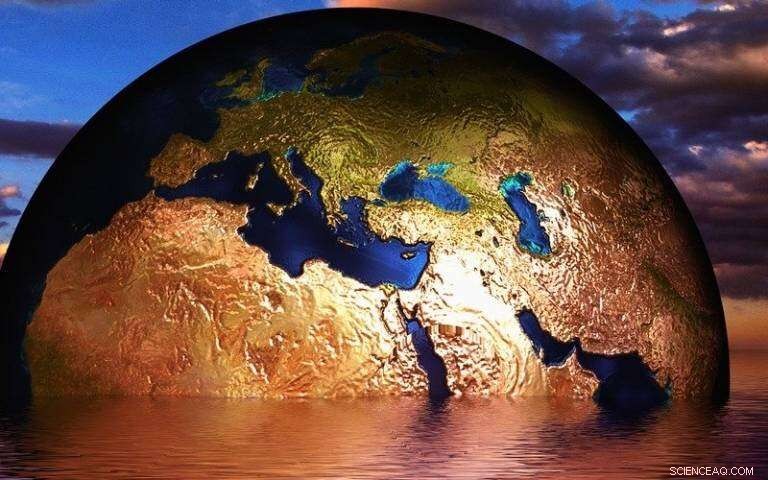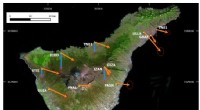
Wetenschap
Wetenschappers waarschuwen G7 dat de kosten van het overschrijden van de 1,5˚C opwarmingslimiet veel hoger zullen zijn dan de kosten om het te bereiken

Krediet:Gerd Altmann van Pixabay
Een groep toonaangevende klimaatwetenschappers roept wereldleiders op om rekening te houden met de economische, milieu- en humanitaire kosten als gevolg van het niet houden van de opwarming van de aarde deze eeuw onder de 1,5 C, in een beweging onder leiding van experts van de UCL, de Universiteit van Exeter en de ICCCAD.
Terwijl de leiders van zeven van 's werelds rijkste landen elkaar ontmoeten in Cornwall voor de G7-top, de wetenschappers hebben een handvest van 1,5 graad gelanceerd om te benadrukken hoe het overschrijden van de 1,5 ° C-doelstelling die in de Overeenkomst van Parijs is uiteengezet, veel meer zal kosten dan armere landen te betalen om de wereldwijde inspanningen om dit te bereiken te helpen.
Het is te hopen dat regeringen, bedrijven en het publiek zullen achter het Handvest staan om het gesprek over klimaatfinanciering te beïnvloeden en belangrijke beslissingen te sturen die worden genomen op de volgende VN-klimaattop, COP26 in Glasgow in november.
Degenen die het meest kwetsbaar zijn voor de gevolgen van de klimaatcrisis, wonen voornamelijk in het mondiale zuiden, maar ze hebben het minst bijgedragen aan de uitstoot van broeikasgassen. Het Handvest stelt dat, om de uitstoot voldoende te verminderen, het zal van rijkere landen eisen dat ze herstelbetalingen betalen aan armere landen. De bedragen moeten een eerlijke afspiegeling zijn van de verantwoordelijkheid van de eerste voor de crisis en de kwetsbaarheid van de tweede ervoor.
Het doel van het Handvest is daarom als katalysator te fungeren om rijke landen aan te moedigen de minder rijken te steunen om niet alleen koolstofarm te worden, maar ook om ervoor te zorgen dat ze het zich kunnen veroorloven maatregelen te nemen om hun huizen te beschermen, banen en land van klimaatgerelateerde effecten zoals extreem weer, slechte gezondheid, banenverlies en voedselonzekerheid.
Ter ondersteuning van het Handvest, de betrokken academici ontwikkelen een wereldwijd onderzoeksproject om de kosten van het overschrijden van een temperatuurstijging van 1,5 ° C volledig te identificeren en te vergelijken met de kosten die al worden verwacht van de decarbonisatie die nodig is om de 1,5 ° C-doelstelling te halen.
Het 1.5˚C Graadstatuut roept overheden in het bijzonder op om:
- Erken de menselijke en economische kosten van meer dan 1,5 C en dat deze kosten onevenredig zullen worden gedragen over de hele wereld en door toekomstige generaties
- Handelen naar hun toezegging om de opwarming van de aarde te beperken tot 1,5˚C
- De ontwikkeling van klimaatfinancieringsmechanismen aanmoedigen die de kosten van het uitstellen van klimaatactie koppelen aan de kosten van decarbonisatie
Hoogleraar Global Change Science aan de UCL, Simon Lewis zei:"Dit gaat over het vinden van oplossingen voor de klimaatcrisis die eerlijkheid belichamen en vertrouwen wekken. Lagere inkomenslanden hebben dit probleem niet gecreëerd, toch betalen ze het al met hun levensonderhoud en in toenemende mate met hun leven. Het is aan degenen die het meest hebben bijgedragen aan het probleem om dat onrecht aan te pakken en in de toekomst vertrouwen op te bouwen. Het oplossen van de klimaatcrisis betekent het erkennen van de reeds veroorzaakte schade en het maken van nieuwe alternatieve plannen en keuzes om dat tij te keren.
"Het mondiale zuiden is tot nu toe een klein deel van het probleem geweest, maar het is een groot deel van de oplossing. We moeten aantonen dat de veiligheid en beveiliging van zijn mensen een prioriteit zijn. Net als bij de pandemie, niemand van ons is veilig totdat we allemaal veilig zijn. evenzo, geen enkel land kan zich volledig beschermen tegen de gevolgen van klimaatverandering tenzij we er allemaal tegen worden beschermd.
"Om ons klimaat te stabiliseren, moeten de emissies tot nul dalen. Maar het bouwen van een welvarende en veerkrachtige wereld vereist meer dan dat, het vereist het vergroten van de macht van de inkomensarmen en het doen van investeringen om degenen te beschermen die buiten hun schuld al het meest lijden."
Hoogleraar aardsysteemwetenschap aan de UCL, Mark Maslin, said:" The science is clear—going beyond 1.5˚C will increase human misery around the world and put a huge financial burden on all of us. Our Charter calls on the governments of the world to invest in dealing with climate change now, which will not only increase people's health and well-being now but will save trillions of dollars.
"We call on everyone that cares about our planet to sign our Charter to show that citizens of the world want Governments, corporations and the wealthy to invest in dealing with climate change. The burden of saving our planet must fall on the wealthiest in our global society as they have contributed most to the problem through excessive consumption."
Professor Tim Lenton, Director of the Global Systems Institute at the University of Exeter said:""Global warming above 1.5C markedly increases the risk of crossing climate tipping points which will do greatest harm to the world's poorest. Multiple abrupt climate changes occur between 1.5˚C and 2˚C global warming in IPCC climate model runs. Going to 2˚C warming risks a collapse of the West Antarctic ice sheet that would accelerate sea-level rise and threaten low-lying islands and coastlines such as Bangladesh. It would also degrade essentially all tropical coral reefs on which many depend for their livelihoods."
"Going from 1.5˚C to 2˚C warming would put hundreds of millions of people—mostly in sub-Saharan Africa and the Indian subcontinent—outside of the climate 'niche' that supports high human population densities today and has done in the past. It would also greatly increase their exposure to life-threatening hot and humid climate extremes."
Professor Saleemul Huq, Director of the International Center for Climate Change and Development (ICCCAD) and Professor at the Independent University Bangladesh (IUB), said:"The concept of loss and damage from human induced climate change is closely connected to whether world leaders keep their commitment to remaining below 1.5 Degrees Centigrade or not. For every fraction of a Degree that the world goes above that threshold, the associated loss and damage will be exponentially worse and will fall mainly on the world's poorest communities in the poorest countries."
Professor Mizan Khan, Deputy Director of the International Center for Climate Change and Development (ICCCAD) and Program Director of Least Developed Countries University Consortium on Climate Change (LUCCC), said:"We already live in a climate-changed world of 1.2˚C degrees higher temperature relative to pre-industrial levels. But with no ambitious mitigation around, adaptation finance to support the most impacted communities is woefully poor. Against this, it is ironic that world military spending witnessed a hike, even in 2020, hitting the two trillion-dollar mark."
Ashish Ghadiali, Activist-in-Residence at UCL's Sarah Remond Center for the study of Racism and Racialisation and a member of the co-ordinating committee of the COP26 civil society coalition, said:"The G7's announcements around digital taxation point to an appetite for innovation in finance that now urgently needs to be applied to the task of delivering climate justice as we approach COP26. As COP president, the UK government currently talks about the objective of coming good on past commitments of $100 billion a year. But these are (broken) promises that were made 12 years ago in Copenhagen. In the time that's elapsed, we've seen the impacts of climate breakdown incur costs related to loss and damage alone in excess of $150 billion a year.
"With rising global temperatures, the costs of climate breakdown are escalating and will continue to do so. The burden of these costs will fall hardest on those living on the frontlines of climate breakdown—those whose lives are already the most precarious and who are least responsible for creating climate change. It will also fall on our children, and on our children's children unless, collectief, we're able to achieve what we're setting out to achieve with this 1.5˚C charter—a paradigm shift in how we perceive our collective responsibility to steer a path towards a sustainable future."
The scientists and academics involved in creating the Charter hope that governments and organizations around the world will back it and use it as a tool to inform public and policy debates on climate finance. The ultimate aim is to create an international climate justice research network, connecting institutions in the global north and south, addressing the limitations of current climate finance strategies and collaborating to replace them with fair, workable alternatives, before it is too late.
The 1.5˚C Degree Charter is hosted on the UCL Climate Hub website.
 Studie onthult nieuwe aanwijzingen over dodelijkste lawine van Mount Everest
Studie onthult nieuwe aanwijzingen over dodelijkste lawine van Mount Everest Magnitude 3.6 aardbeving schudt een deel van Zuid-Californië
Magnitude 3.6 aardbeving schudt een deel van Zuid-Californië De oorsprong van het landschap van de High Plains
De oorsprong van het landschap van de High Plains Wat is de beste manier om de uitstoot van broeikasgassen te verminderen?
Wat is de beste manier om de uitstoot van broeikasgassen te verminderen? Aardbeving van 6,5 op de schaal van Richter treft centraal Filippijns eiland:USGS (update)
Aardbeving van 6,5 op de schaal van Richter treft centraal Filippijns eiland:USGS (update)
Hoofdlijnen
- Sociale omgeving is belangrijk voor de grootte van de eendenpenis
- Primaire en secundaire seksuele kenmerken
- Hoe celconcentratie te berekenen
- Gestrande walvisachtigen? Daar is een app voor
- Hoe de botten in het menselijk skelet te bestuderen
- Wat is ongelijk verdeeld in de vrouwelijke cytokinese?
- DNA is digitaal geworden - wat kan er mis gaan?
- Eiwit beëindigt opzettelijk de eigen synthese door de synthesemachinerie te destabiliseren - het ribosoom
- Hoe handhaaft het plasmamembraan homeostase?
- Onderzoek:impact van campagnes tegen voedselverspilling gedempt, maar wijs in de goede richting

- Afval stapelt zich op in de VS terwijl China de deur sluit voor recycling

- Opkomende landbouw en landschapsverstoringen bedreigen de doelstellingen van het klimaatakkoord van Parijs

- De eilanden Tenerife en Gran Canaria zouden binnen miljoenen jaren dichter bij elkaar kunnen liggen

- Positieve effecten van mensen op het ecosysteem

 Coronavirus heeft de grootste impact op natuurtoerisme
Coronavirus heeft de grootste impact op natuurtoerisme Hoe Amethyst te vinden in Georgië
Hoe Amethyst te vinden in Georgië  Waarom zitten we niet allemaal in dezelfde tijdzone?
Waarom zitten we niet allemaal in dezelfde tijdzone?  lijnen, bars vertellen voetgangers waar de auto heen wil
lijnen, bars vertellen voetgangers waar de auto heen wil Materiaalwetenschap:het defect perfectioneren
Materiaalwetenschap:het defect perfectioneren Schoolbeoordelingen van ouders correleerden met testscores en demografie, niet schooleffectiviteit
Schoolbeoordelingen van ouders correleerden met testscores en demografie, niet schooleffectiviteit Russische scheikundigen hebben een manier ontwikkeld om medicijnen te synthetiseren uit hernieuwbare voorlopers
Russische scheikundigen hebben een manier ontwikkeld om medicijnen te synthetiseren uit hernieuwbare voorlopers Internet of things kan een ongeziene bedreiging vormen voor verkiezingen
Internet of things kan een ongeziene bedreiging vormen voor verkiezingen
- Elektronica
- Biologie
- Zonsverduistering
- Wiskunde
- French | Italian | Spanish | Portuguese | Swedish | German | Dutch | Danish | Norway |

-
Wetenschap © https://nl.scienceaq.com

